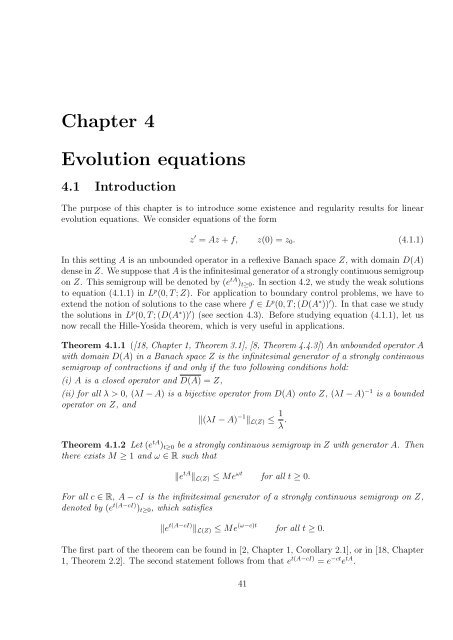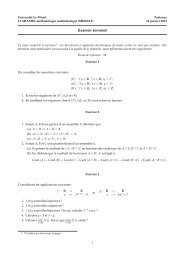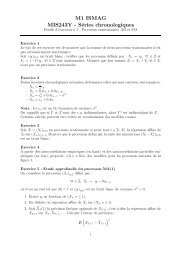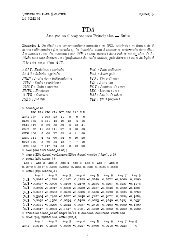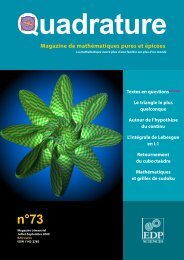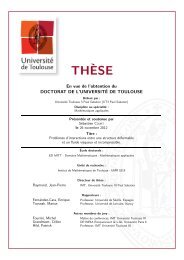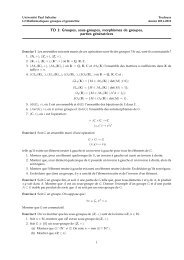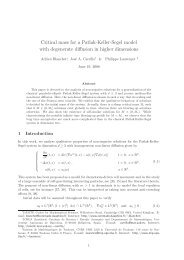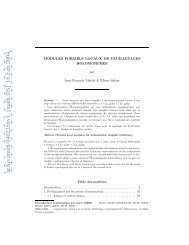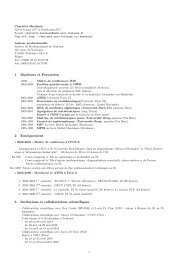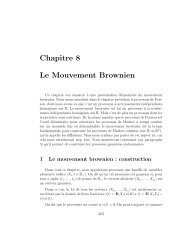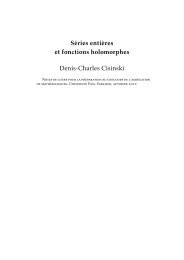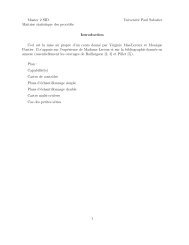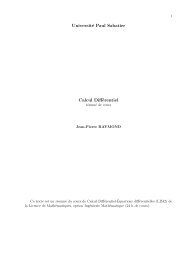Optimal Control of Partial Differential Equations
Optimal Control of Partial Differential Equations
Optimal Control of Partial Differential Equations
Create successful ePaper yourself
Turn your PDF publications into a flip-book with our unique Google optimized e-Paper software.
Chapter 4<br />
Evolution equations<br />
4.1 Introduction<br />
The purpose <strong>of</strong> this chapter is to introduce some existence and regularity results for linear<br />
evolution equations. We consider equations <strong>of</strong> the form<br />
z ′ = Az + f, z(0) = z0. (4.1.1)<br />
In this setting A is an unbounded operator in a reflexive Banach space Z, with domain D(A)<br />
dense in Z. We suppose that A is the infinitesimal generator <strong>of</strong> a strongly continuous semigroup<br />
on Z. This semigroup will be denoted by (e tA )t≥0. In section 4.2, we study the weak solutions<br />
to equation (4.1.1) in L p (0, T ; Z). For application to boundary control problems, we have to<br />
extend the notion <strong>of</strong> solutions to the case where f ∈ L p (0, T ; (D(A ∗ )) ′ ). In that case we study<br />
the solutions in L p (0, T ; (D(A ∗ )) ′ ) (see section 4.3). Before studying equation (4.1.1), let us<br />
now recall the Hille-Yosida theorem, which is very useful in applications.<br />
Theorem 4.1.1 ([18, Chapter 1, Theorem 3.1], [8, Theorem 4.4.3]) An unbounded operator A<br />
with domain D(A) in a Banach space Z is the infinitesimal generator <strong>of</strong> a strongly continuous<br />
semigroup <strong>of</strong> contractions if and only if the two following conditions hold:<br />
(i) A is a closed operator and D(A) = Z,<br />
(ii) for all λ > 0, (λI − A) is a bijective operator from D(A) onto Z, (λI − A) −1 is a bounded<br />
operator on Z, and<br />
(λI − A) −1 L(Z) ≤ 1<br />
λ .<br />
Theorem 4.1.2 Let (e tA )t≥0 be a strongly continuous semigroup in Z with generator A. Then<br />
there exists M ≥ 1 and ω ∈ R such that<br />
e tA L(Z) ≤ Me ωt<br />
for all t ≥ 0.<br />
For all c ∈ R, A − cI is the infinitesimal generator <strong>of</strong> a strongly continuous semigroup on Z,<br />
denoted by (e t(A−cI) )t≥0, which satisfies<br />
e t(A−cI) L(Z) ≤ Me (ω−c)t<br />
for all t ≥ 0.<br />
The first part <strong>of</strong> the theorem can be found in [2, Chapter 1, Corollary 2.1], or in [18, Chapter<br />
1, Theorem 2.2]. The second statement follows from that e t(A−cI) = e −ct e tA .<br />
41


